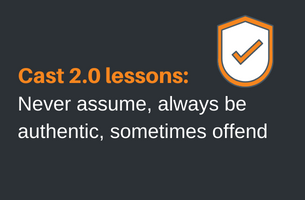
Wayne Brophy
Jul 09, 2019
Cast 2.0 lessons: Never assume, always be authentic, sometimes offend
Our summer conference was like watching a TED Talk on Supply Chain Recruitment differentiation but by special invite only. (Followed by some laid-back celebrations of our best-ever year of performance in the rare Manchester sunshine). Read on for what our guest speakers had to say about avoiding a race to the bottom in the supply chain, why most USP's are anything but unique, how overlapping your ‘three faces’ wins business and why you shouldn’t always be afraid to offend if you're just being honest.
Avoid a Race to the Bottom: Differentiate on service & some innovation
Paul Whyte, Managing Director, Best Food Logistics
It was eye-opening and completely inspiring to see the change and transformation programme Paul Whyte led at Best Food Logistics (formerly Bidvest). Paul’s talk was frank. He shared with us the shocking client feedback and SLA figures he had to work with as a starting point and how he managed to take Bidvest from this point to SLA figures that beat the competition hands-down. We’ll be sharing more about the lessons learned in Paul Whyte’s presentation. However, for now we’ll leave you with this:
Never assume what your clients want and never compete only on price. Doing so, leads to a loss-building exercise where there is no room to compete on service. Focus on keeping existing clients happy and how you can build a better experience through innovation.
As Henry Ford once said, “If I had asked people what they wanted, they would have said faster horses.”
Are your USPs really unique?
Alison Humphries, Recruitment NED, Recruitment Leadership Ltd
Alison Humphries talk focused on how we, as recruiters, can differentiate ourselves in a saturated market of 155,000 recruiters. Alison gave examples of common ways that recruiters attempt (badly) to differentiate themselves:
- “Recruiting for over 20 years…"
- “Sector specialists”
- “We won’t waste your time with unsuitable candidates…”
The talk made me reflect further on our differentiation. In an industry that is ALL about people, it can be difficult to communicate exactly what makes us different. Luckily, we do have valid USPs (like our slick process automation that makes unhappy candidates a thing of the past, our ahead-of-the-curve adoption of video and our employer branding services). It's just about communicating this effectively - and more consistently. How does your brand stand out? Does your employer branding sound the same as everyone else? If so, why not call us on 0333 121 3345 to discuss how we can help?
Be authentic to stand out: Overlap your three ‘faces’ as much as possible
Ryan McCabe, CEO from Odro
Ryan McCabe’s talk was really personal (all the best stories are). He took us from his experience failing as a recruiter, to his small triumphs and bigger set-backs at Odro (the video interviewing software platform for recruiters). We’ll cover more about all the lessons Ryan shared but one that really stood out was this:
The Japanese say that you have three faces. The first is the one you show to the world. The second is the face you show to your close friends and your family. The third face is the one you never show to anyone, not even your partner.
The smaller the difference between these faces, the more authentic you will be. Try by being you first and professional second - instead of being professional and then trying to inject some personality.
And as people buy from people, it takes you much further. Well, it certainly did for Ryan - his openness and honesty was clear - and Odro is a major success.
Say what your audience won’t: Don’t be afraid to offend
Dan Kelsall, Chief 'Hype' Officer, Offended Marketing
Dan Kelsall has made quite a name for himself in the content marketing world. Let’s just say he is a fan of the odd expletive to get his point across that most content produced on LinkedIn or in blogs is rubbish.
LinkedIn is now saturated with average content and so-called 'influencers' as above. Everyone loved the interactive game of “Good hook, s**t hook” (he used the word over 30 times!). It got the team to think about how you hook people into your message without it being false click-bait. One of the most important takeaways was this: people aren’t as offended as you think. Dare to be different, instead of just copying what you’ve seen work well for someone else. If you’ve got an opinion, then say it. Your people are your brand and they can all be different. When you focus your content on your core target market, it’s much more likely to have an impact. Yes, it may p**s a few people off but do you really give a s**t (as Dan would say)? Let’s just put it this way: Dan pitched his presentation perfectly. He was in a room of recruiters and he may have offended some but the majority were laughing along - and most importantly, raring to get to work on Monday to put his advice into practice. It’s unlikely we’ll adopt swearing into our approach to content but we will be making our opinions heard more - even if they are controversial. So stay tuned! As you can see, a common theme running through the day was the importance of being authentic in business and digging deep to realise how you can differentiate in a way that your customers really value (because it’s not just low price). Your people are your brand. We’ll be covering the individual talks in more detail over the coming weeks, so sign up to our newsletter with just a few brief details to make sure you don’t miss the valuable insights. Meanwhile, if you want to build a great employer brand and a thriving business, recruiting for culture fit (or culture ‘add) is key.


